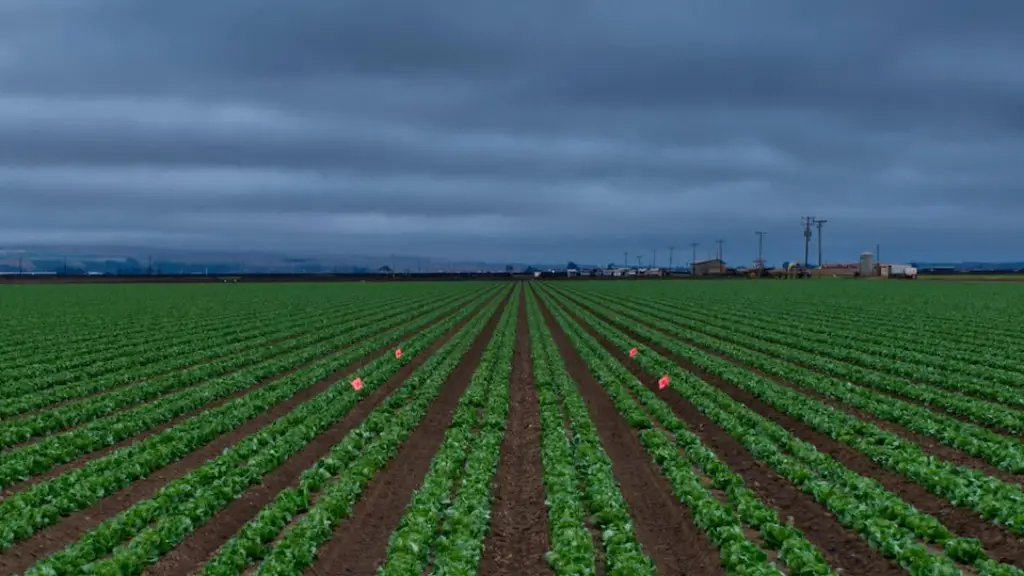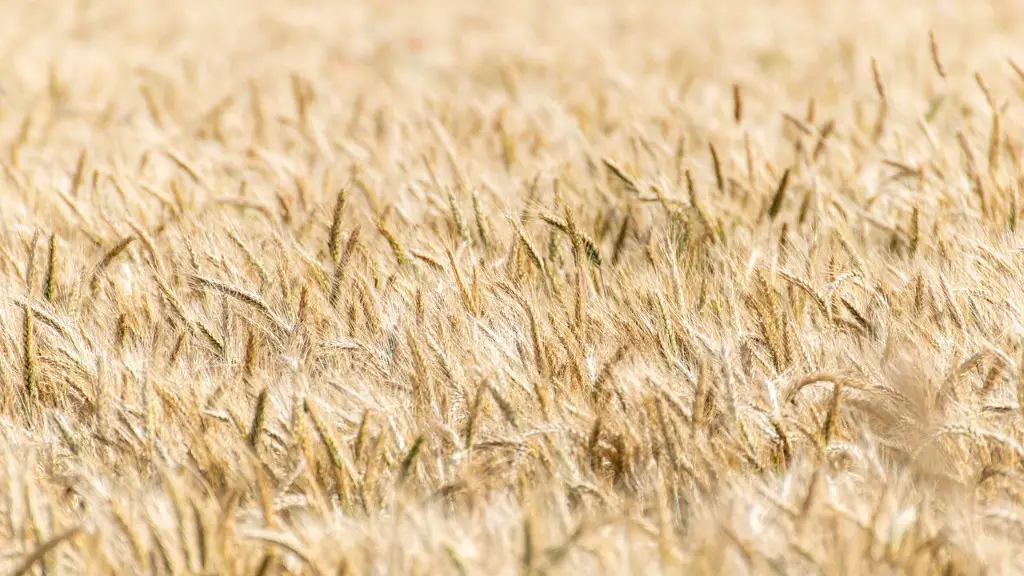Agriculture has played a major role in shaping the way people live today. It has allowed humans to transition from a hunter-gatherer lifestyle to one of sustainability, enabling them to settle down in one area and farm for food. With the development of agriculture, humans have been able to store food for future consumption and have been able to exchange food and goods with others. Agriculture has drastically changed human lives in various ways.
One of the most notable changes is that it has allowed people to move away from relying solely on hunting and gathering. Before agriculture, people were highly mobile and would have to migrate in search of food sources. Once agriculture was adopted, people were able to stay in one area and was no longer dependent on hunting and gathering. This allowed for a more settled lifestyle and allowed them to stay in one area. This eventually led to early civilizations, which were more complex than hunter-gatherer societies.
Agriculture has also allowed people to store food for later consumption. This has helped to decrease food insecurity and gave people more stable sources of food. With the development of food storage techniques, people were able to survive short-term ecological shifts, droughts, floods, and other disruptions to food production. This was a major advantage for early societies and allowed for the growth of civilizations around reliable sources of food.
Agriculture also allowed for trade and the exchange of goods. The ability to store and preserve food enabled people to produce more than they needed and exchange with others. Early societies were able to carve out economic systems and developed trading routes that stretched for miles. This form of economic resource exchange would have been much harder to achieve without the advances of agriculture.
Lastly, agriculture has allowed people to shape their environment in ways that are not possible with hunter-gatherer societies. People were able to clear out forests and create land for farming, which helped to increase the population size and provide a stable food source. This type of intentional land management is one of the major differences between hunter-gatherer societies and the civilizations that grew up around agriculture.
Social Roles
Agriculture has also drastically changed the social dynamic of people. With the introduction of farming and the growth of civilizations, people were placed into different social roles and stratified societies emerged. These social and economic differentiations were rooted in agriculture, as it shifted people from being independent mobile bands to living in complex, hierarchical societies. This led to the development of social classes, job specialization, and the formation of government.
With the emergence of agriculture, social roles became determined by ones access and ownership of land. This also led to unequal distribution of wealth and power, as people with a larger amount of land and resources had greater control over the production of food. This helped to shape the class structures that exist in modern societies.
Agriculture also allowed for the development of political and religious institutions, as it provided a stable source of food. This enabled rulers to have extra resources to use for their own political goals and allowed for the growth of religious organizations. This was one of the main reasons for the development of early civilizations, as it increased the resources available to rulers and allowed for the growth of other institutions beside food production.
Overall, the development of agriculture has been one of the main factors in shaping human societies around the world. It has provided a stable source of food, allowed for the growth of civilizations, and shifted people away from hunter-gatherer societies. It has drastically changed the way people live and has been a major factor in shaping modern societies.
Technological Developments
One of the major impacts of agriculture is the development of new technologies. The introduction of farming allowed people to develop new tools and techniques that allowed them to cultivate the land and produce food more efficiently. As civilizations continued to grow and rely heavily on agriculture, new tools and technologies were developed.
The plow was one major development that allowed people to work large fields of land and increased the production of food. This allowed for larger populations and enabled some civilizations to become empires. Other technological developments that allowed for increases in food production include the waterwheel, the windmill, the use of fertilizer, and other farming techniques.
With this increase in productivity, people also began to develop other technologies that were not necessarily tied to agriculture. This includes various forms of writing, advances in construction, development of military technologies, and communication systems. This had a major impact on civilization and allowed for population growth and the emergence of cities.
Overall, the development of agriculture has been connected to the development of new technologies. This has allowed civilizations to become more efficient in their production of food and led to the emergence of empires and cities. Technology plays a major role in the development of human societies, and the emergence of agriculture has been central in this development.
Ecological Impacts
Agriculture has also had a major impact on ecosystems around the world. The introduction of farming led to the clearing of forests and the fragmentation of habitats, which had a dramatic impact on the environment. This led to the transformation of natural ecosystems, as large areas of land were converted for agricultural purposes.
The conversion of these habitats caused the loss of biodiversity, as many species were displaced and unable to adapt to a changing environment. This also led to the unnatural spread of certain species and the overgrowth of certain habitats, which can lead to further degradation of an ecosystem. The homogenization of ecosystems has been a major consequential effect of agriculture.
While agriculture has had a major impact on the environment, it has also allowed for the management of certain habitats. As civilizations adopted agriculture, they were able to use techniques such as crop rotation and the development of irrigation systems to increase yields and manage the environment around them. This has been beneficial for some ecosystems, as it has allowed people to expand their production of food while maintaining the health of the ecosystem.
Overall, agriculture has had a major impact on the environment. It has allowed people to manage the land and increase food production but has also caused the loss of biodiversity and the homogenization of natural ecosystems. While agriculture has benefited many people, it has also had major ecological impacts.
Cultural Impacts
Agriculture has also had a major impact on culture, as it allowed humans to transition from a nomadic lifestyle to a more settled way of life. This transition allowed people to form social structures, religious organizations, and political systems. It enabled people to devote more time and resources to art and projects that don’t involve food production and helped to create a more complex societies.
Agriculture has also allowed people to pass down their culture and knowledge to future generations. With a more settled lifestyle, people were able to embed and relive their culture and history and pass down their knowledge to the next generation. This was not possible with a nomadic lifestyle and has allowed for the development of complex cultures that have passed down their knowledge for centuries.
With the emergence of different cultures and societies, people were also able to exchange cultural knowledge and ideas. This allowed for the emergence of different religions and philosophies, the exchange of goods and resources, and the emergence of key historical figures. Overall, the development of agriculture has been at the heart of the development of major cultures, societies, and civilizations.
Economic Benefits
Agriculture has also been at the heart of the emergence of modern economic systems. The ability to store and trade food allowed people to build up resources and stimulate economic activity. The emergence of trade routes and the exchange of goods allowed for the growth of cities and the emergence of a monetary economy. This allowed people to purchase goods and services that were not available in their own area, which in turn stimulated the economy and increased prosperity.
Agriculture also enabled people to develop their own systems of currency, a system of taxation, and other forms of economic systems. This allowed governments to generate revenues and redistribute wealth, and also created the need for government policies and regulations. This helped to create and shape modern economies, which have become one of the major factors in the development of societies.
Overall, the development of agriculture has had a major impact on economic systems. It allowed people to develop markets and exchange goods, allowed governments to collect taxes and regulate economic activity, and allowed cities to become centers of economic activity. Agriculture has been at the heart of economic development and has enabled the emergence of modern economies.





